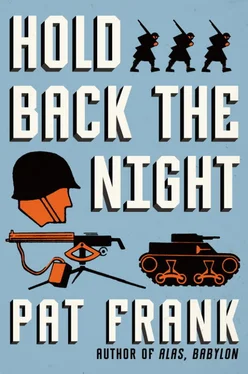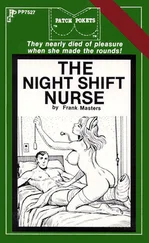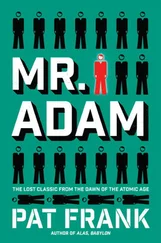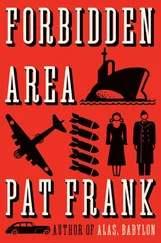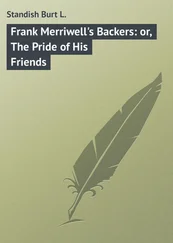At this point Couzens should have waited. He should have waited for Mackenzie to come up with the rest of the force, so that the house could be surrounded, and riddled and blown apart by cross-fires, and the enemy destroyed without loss. For of course Mackenzie had seen what had happened, and what had gone wrong, and would be streaking down the road to help him. But at this point Couzens’ cleft mind was not functioning rationally, and he called to Cohen and Kavanaugh. “We take that house,” he said. “We take it.” And he advanced upon it, and they followed him uncertainly.
This house had two windows on the second floor, and the flame of a burp gun flickered from one of these windows and Couzens’ M-1 snapped to his shoulder and he fired fast as if he swung on a single quail bursting from a palmetto clump. “Got him,” he said, but fire was returned from both windows. He waited for Kavanaugh to blow them apart with the bazook and when Kavanaugh didn’t fire he looked over to where Kavanaugh should be, and he saw Kavanaugh, but Kavanaugh’s face was flat on the ground, and he was hit. And he looked over to where Cohen should be and he was hit, too, and down on his side, his knees jerking.
Couzens went on. Whenever he saw the flash of a brown face or hand he fired.
Running down the road, with Ackerman and Ekland, Mackenzie saw this and he stopped and shouted, “Get back, Raleigh! Get the hell back!”
Couzens heard this shout, but he did not obey. He walked on.
Then Mackenzie saw his lieutenant bow his head and sink to his knees, as if to pray, and then slide forward on his face.
After his men had disposed of the survivors in the house, swiftly and efficiently, Mackenzie tried to evaluate his loss and reorganize the company and push on. He had little heart for it. Raleigh Couzens had five, maybe six, small calibre bullets through the stomach. He was unconscious, and his bazooka man and his rifleman, the one still alive, were badly hurt too. And the bazooka was riddled, so now there was only one bazooka. He and Ekland did what they could for the wounded, with sulfa and penicillin, and had them placed on litters.
The burning jeep was the jeep with the rations packed in its back seat, so now Dog Company had no rations except the combat rations the men carried in their pockets.
Mackenzie wished he could call a halt here, but he dared not. Now speed was essential. They must get out as quickly as possible. Another detachment of Chinese might enter the village, and anyway it was a place of ill luck. “Sergeant,” he told Ekland, “have the litters strapped to the hoods of the jeeps, and let’s get going.”
“Yes, sir, except—”
“Except what?”
“What are we going to do for rations, sir?”
“We’ll worry about that when we get hungry. Right now we’ve got to get out of here. The quicker we start moving the quicker we’ll get to some place where these men can be treated, and we can get rations.” He hoped this was true, but of course he had no way of knowing. It was the only thing to say.
And the column moved out of the unlucky village of Chungyang-ni, and crossed the railroad tracks, rusty under a veneer of ice, and trudged uphill into the loneliness of the road.
The road ascended steadily and the men walked with bent heads, and there was no sound except the laboring motors of the jeeps, and the pain of the wounded. They were all unconscious now, and Mackenzie was grateful for this, but still they made noises when the jeeps jolted in the ruts.
At noon Mackenzie called a break, and the men ate what rations they had left. Mackenzie wondered how long men could endure, and march, without rations in this cold, but of course he said nothing of this to the men. He called Ekland, and together they went over the map.
“This place up here,” said Mackenzie, pointing to a black dot on the map which marked some sort of habitation, “this place is where we’ll spend the night. Then tomorrow we’ll make it to the perimeter, if there is a perimeter up there. How far ahead do you think that place is, sergeant?”
“This map is sort of crazy,” Ekland said. “You look at this map and you’d say four or five miles to that little place, but the map doesn’t show the ups and downs. I’d say four hours’ march, sir.”
“That’s what I figure, too,” said Mackenzie. “Anyway, that’s where we’ll stop.”
As they marched, the character of the land changed. The paddy fields, and all sign of man, vanished, and there were no longer gentle slopes such as they had seen in the valley of the railroad. Sheer rock climbed at their right, and to their left the slope deepened and the jeep drivers became wary of the left, for if they skidded they could drop off three or four hundred feet. And this land was forbidding, and seemed to close them in. And it grew colder as they climbed, and in the narrow places between the walls of this gorge the wind screamed. This wind that had crossed the frozen steppes of Asia screamed like a live and fanatic enemy.
Just before dusk they came to a place where the road widened and the land grew more level, on the crest of a ridge, and Mackenzie said to Ekland, “This must be it,” and he looked about him for houses, but there were no houses.
“This was it, sir,” Ekland said. He pointed to blackened timbers not quite buried under the snow. If you looked closely, you could see that three or four houses had once been here, but they had all burned. How long ago, or for what reason, they could not figure out. It didn’t matter. They were gone.
“Well, let’s get on with it,” Mackenzie said. “We’ll find some other place ahead.” He knew this wasn’t true. He knew they would have no shelter in the night. But the further he could lead, or drive them, this day, the better chance they’d have of finding someone, or some place, the next day.
They moved on, slower. They moved even after darkness came. They moved until Mackenzie’s legs would move no more. The collapse of his men was immediate. He had to kick them to their feet to force them to change their sweat-soaked socks, which would surely freeze in the night. The litters, with the wounded, he ordered placed under the jeeps, where they would have some protection from the weather. Then Mackenzie, numb and exhausted utterly, collapsed too. His mind was so tired, and so concentrated on his men, that he forgot an important thing. His jeeps needed warmth in the night.
After his captain slept Ekland crawled into the front seat of the lead jeep, and found the walkie-talkie. The map told him there was no chance of his voice reaching anyone. His logic told him too. But one could never be certain with radio waves. There were skip waves. There was the Heaviside bounce. And anyway it was comforting to believe someone could hear him. “This is Lightning Four,” he said. “This is Lightning Four calling Lightning. Come in Lightning.”
He repeated this several times, but there was never any answer, and at last he gave up, and got out of the jeep, and found a place for himself against the cliff, and slept.
IT WAS DURING this terrible night that the three wounded died, and the jeeps froze solid.
And it was on the following morning that Mackenzie jogged himself, and his men, into movement with the promise of the bottle of Scotch. It was the morning they ate combat rations that Ekland found in the pockets of the dead. It was the morning they were shadowed by the Mongol horsemen watching them from the cone-shaped hills across the gorge, and the morning they were ambushed by mortars when they reached a place of danger where the road left the protection of the cliff, and ran out into the rock-strewn flatland to touch a frozen stream.
And now Ackerman, the quiet corporal from Pennsylvania, lay dead out on the flatland, and under Ackerman was Dog Company’s last bazooka. Mackenzie had told Nick Tinker, the youngest of them all, to go out and bring back the bazooka, for without the bazooka he didn’t think they had a chance for it.
Читать дальше
